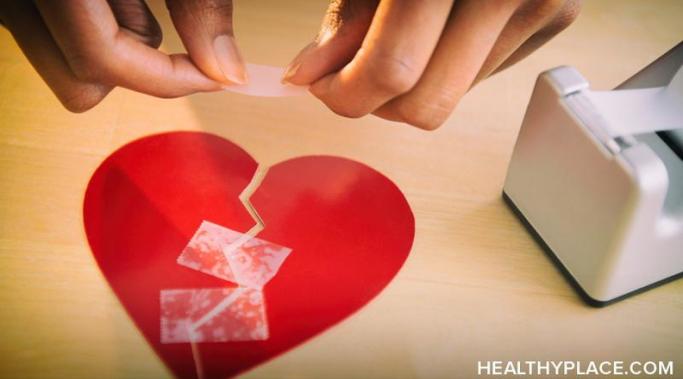One day I was in a pub eavesdropping on the girls deep in conversation next to me. They were chatting about bisexuals. They were commenting that they would never date a bisexual as really bisexuals were heterosexual that were just playing around with homosexuality and eventually they would “turn back” into heterosexuals.
Well, I, being bisexual was a little insulted by this. I have not “turned” into anything. I simply am bisexual like they are simply gay.
I realized though that it was lucky for me that I heard these girls talking because I could cross them off my list as I have no desire to date sanctimonious, self-righteous, ignorant women.
And I also realized this: it’s their loss.
I’m great.
I only lost sanctimonious, self-righteous, ignorant women while they lost me.
And the same is true of mental illness. When someone rejects you simply because of a medical illness that you didn’t ask for and over which you have no control, you are only losing someone ignorant while they are losing the amazing person that is you.
Breaking Bipolar
There is an interesting, if perhaps disturbing, phenomenon in psychopharmacological drug treatment. It is the instance where a person initially has a satisfactory response to a medication, getting well, and perhaps staying well for years, only to have the illness come back at a random time in the future. The medication just “stopped” working. We have known about this for a long time with many drugs including antidepressants and anticonvulsants (mood stabilizers) and it’s sometimes referred to as antidepressant “poop-out” (I kid you not).
But this phenomenon goes against even the most basic understanding of medication, so why is it happening?
Bipolar is a disease that takes over your brain – well, parts of your brain anyway – and these affected parts of your brain change your psychology right along with them. So once when you felt “normal” or let’s say, average, you now feel utterly destroyed. Your emotions are altered thanks to the attack on your brain.
And what’s worse about this is that bipolar or depression fundamentally changes who you think you are at that moment. If you used to be a fun-loving, happy-go-lucky sort, in a depression, nothing could be farther from the truth. When manic, all your thoughtful, careful ways become things of the past. You can barely identify with the person you were pre-mood.
And perhaps even worse than all that is that some part of you sees this dissonance. You know that who you are at that moment isn’t who you really are. It’s like someone else, a crazy person, moved right into your head and body and coopted your life. Bipolar snatched your body and brain.
As I wrote last time, I consider about 95% of the time we spend feeling guilty wasted time. I have suggested that guilt does no one any good and instead of sitting around feeling guilty, we should try to make amends for whatever it is about which we feel guilty.
But how does one make amends?
Guilt – noun – a feeling of responsibility or remorse for some offense, crime, wrong, etc., whether real or imagined.
And people with a mental illness feel guilt over a lot of things. I hear from people every day who feel guilty about their illness, what they’ve done, what they haven’t done and how their mental illness and their behaviors due to it affect others (Feeling Guilty Because You Have a Mental Illness).
But mostly I consider guilt a waste of time in mental illness recovery.
Recently, I was talking with someone on Twitter and she was concerned about the side effects of psychiatric medication X. I asked her what her starting dose was for the psych medication and she said 15 mg. Now, I’m not a doctor, but I can tell you two things:
That is ridiculous.
That will certainly make the patient stop the medication early due to side effects and never even find out if it works.
On Twitter a follower asked me about a specific side effect of a medication. She was considering taking the medication and was worried she might suffer from this side effect. This is a reasonable concern and it’s good that she’s researching the drug's effects and possible problems ahead of time.
But the thing is, while knowing about the possibilities is good, worrying about the possibilities is pretty useless. You won’t know if you will get the side effect unless you actually try the drug. The only way to know what is going to happen is to roll the dice.
I recently returned from a trip to Chicago. I was at the National Council’s Conference on Addiction and Behavioral Health. I had a great time and met lots of great people (including our own Randye Kaye, author of Mental Illness in the Family here at HealthyPlace).
But the conference was in Chicago, and while a great city, it did mean a day’s worth of travel and two time zone changes to get there. And travel has been known to really take it out of me.
But I have learned tips for navigating travel with less disruption to my bipolar disorder.
Stigma is something that can be seen outwardly like when a family member avoids you due to your depression or you’re passed over for a promotion because your coworkers discovered you’re diagnosed with schizophrenia. It’s also seen in public perceptions as noted in the Surgeon’s General report where 60% of people felt like people with schizophrenia behaved violently.
But the biggest danger of mental health stigma is when it’s felt inwardly. Because no matter how unfairly people treat you ourwardly, it’s nothing compared to the effects of feeling the stigma inside.
I am single. I have been single for a long time, actually. It’s OK; I don’t mind it that way. I have my dalliances, I have my friends and I have my cats. It’s a touch stereotypical, but it’s my life.
I have, however, fallen victim to an irrational line of thought from time to time – I really want to couple. Some of this desire is completely rational. It’s normal to want to spend Sundays in bed with someone and have someone to share orange juice with in the mornings.
What isn’t rational, though, is the idea that a relationship will make me “happy,” will make me “better.” In times when bipolar feels it’s darkest, more than anything I just want someone to hold onto even if holding onto someone doesn’t work.
Holding onto someone, however special, will not cure bipolar disorder.

![MP900227837[1]](/sites/default/files/styles/blog_listing/public/uploads/2012/05/MP9002278371-124x180.jpg?itok=xgyGSOGl)






![MP900432825[1]](/sites/default/files/styles/blog_listing/public/uploads/2012/04/MP9004328251-1024x685.jpg?itok=Qp2qZbBY)
![MP900442827[1]](/sites/default/files/styles/blog_listing/public/uploads/2012/04/MP9004428271.jpg?itok=jPcAEaSI)